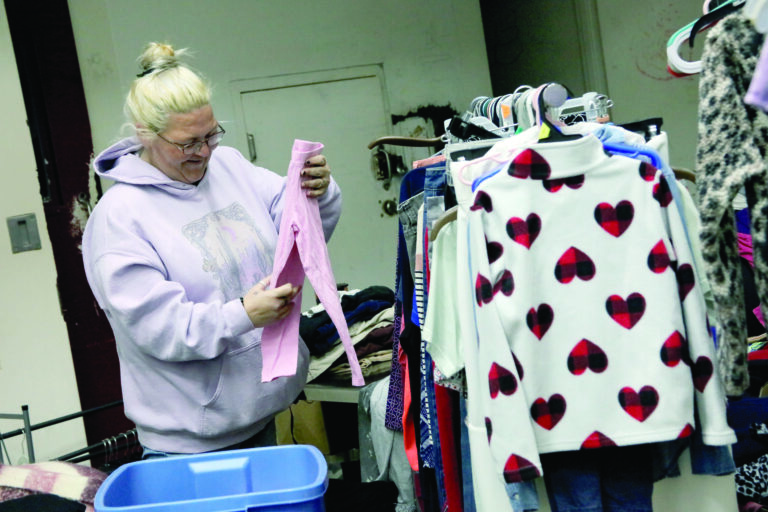CFPD proposes sales tax
Nov. 4 vote could more than double revenue, negate property tax
BY KYLE TROUTMAN [email protected]
The Cassville Volunteer Fire Protection District is asking voters on Nov. 4 to approve a half-cent sales tax, a move Chief Derek Acheson said is aimed at keeping pace with facility needs, rising costs, aging equipment and increasing call volumes that have outgrown the district’s current property-tax-based funding.
“Realistically for us, it’s just the cost of running business,” Acheson said. “Our newest truck that we have is a 2004. It cost us about $250,000 brand new, and if we were to try to buy that new truck today, it’d be about $600,000.”
Acheson said the district’s expenses have ballooned over the years, while revenue has increased marginally.
“All of the cost of maintaining everything is going up, and our budget has only been going up about 5% a year,” he said. “Back when we became a district in 2004 and started in 2005, our first budget was $170,000. This year, we just completed our budget for $270,000; so over 20 years, it’s only grown about $5,000 a year.”
Acheson said the state’s recent property appraisal adjustments will bring in a small increase, but not nearly enough to keep up with needs.
“Next year, we’re projected about $280,000,” Acheson
Who: Cassville Volunteer Fire Protection District What: Proposing half-cent sales tax to ultimately replace current property tax More: Facility enhancements, staffing targeted for improvement said. “It still went up about $10,000, but the cost of everything is going up, along with call volume.”
While rising costs are one factor, Acheson said the other is increasing service demand.
“Our goal is to continue to help with medical calls,” he said. “All EMS services are stretched thin, and sometimes, if those are longer wait times from Barry-Lawrence or Newton County ambulances, it just helps to offer a better service to our constituents overall.”
Despite careful budgeting, Acheson said the district is reaching a breaking point.
“At the end of the year, I think we’re probably going to have about $25,000 to $30,000 to set aside for any capital improvements,” he said. “At that rate, we’re not seeing anything in the future to maintain that.”
Acheson said maintenance issues highlight the challenge.
“Our ladder truck broke down on us, had some motor issues, and it was out of service for almost two months,” Acheson said. “It cost us nearly $30,000 to get it fixed, so very quickly that can eat up more than what we have set aside.”
For those reasons, among others, Acheson said the board chose to pursue a sales tax instead of a property tax increase.
“Cassville makes a lot on tourism,” he said. “Looking back historically, a half-percent sales tax 10 years ago would have brought in about $430,000, and last year, it would have been closer to $700,000. It’s keeping up with the price of everything way better than property tax. If we’re around the $600,000 to $700,000 mark, that’s going to sustain us for quite a while.”
Acheson said a switch may also ease the burden on property owners.
“We wanted to take some of that fire property tax off the residents,” he said. “That was more of an incentive to go with a sales tax instead of asking for more property tax.”
Iff the sales tax is approved, the current property tax, Acheson said, would be reduced to 50% in the first year, and plans are to reduce it to zero by the third year of sales tax receipts. Another factor in the decision to ask for a sales tax is the possibility of Senate Bill 3, which goes to voters in April 2026, and, if approved, would freeze property tax rates for all county residents.
If the District’s sales tax is approved, Acheson said the revenue would allow the district to plan for growth while maintaining stability.
“Some people think sales tax is volatile, but I’d rather play with that cushion,” Acheson said. “If it fluctuates $100,000 at $700,000, that’s still better than the $270,000 we have now with no room to breathe.”
If approved, Acheson said the district’s first priority would be facilities, aiming to add a training area and living quarters for firefighters.
“We don’t have a classroom, we only have one office and we don’t have any living quarters,” Acheson said. “Our goal was to close in [Station 1 on Sale Barn Road], and when we looked about three years ago, it was $800,000 just to do that.”
Acheson said the district’s second station also lacks basic infrastructure.
“Station 2 at Highways AA and 112 has electric and propane, but it doesn’t have water or living quarters,” he said. “That’s where our biggest residential growth is, so we’d like to add smaller living quarters there too.”
Acheson said estimates for building improvements range from $2 million to $3 million.
“To be more fiscally responsible, it may be beneficial to do it on the front side and finance it,” he said. “That would help us get to our end goal quicker and start implementing overnight shifts.”
Along with facilities, passing the sales tax proposal could have a significant effect on staffing.
“The first thing voters would see is people responding from the fire station during our peak times,” he said. “Our goal is ultimately seven days a week, but we’d have to process that in slowly because the money wouldn’t start coming in until July [2026].”
The district currently has 18 volunteers, many of whom also work fulltime in other emergency services.
“We are blessed in Cassville with the number of shift workers who volunteer with us,” Acheson said. “The downside is that on some days, especially Fridays, we’re very light on volunteers inside the district. As a chief, you don’t want that, because it makes me uneasy when we have medical calls that nobody can get to.”
Acheson said additional funding would allow for part-time staff to be stationed at the firehouse and improve response times.
“Our volunteers could pick up some of that part-time work,” he said. “We could also hire firefighters from other districts who want to work a few shifts a month and earn some extra money.”
He also hopes to make his own position fulltime.
“That is ultimately my goal, but it will depend on the board,” Acheson said. “One of the proposals is to have a full-time chief and a part-time deputy chief who would oversee maintenance and operations.”
If the measure fails, Acheson said the district would have to make cuts.
“If it doesn’t pass, we may have to get rid of some trucks,” he said. “Maintenance is going to outgrow our budget, and if we start reducing apparatuses, we’ll have to reduce responses. There would be no building improvements or part-time staff, and we’d just have to live within our means.”
The district currently responds to roughly 900 calls per year, up from just over 200 two decades ago.
“In 2006, we ran about 226 calls, and last year we were at 1,132,” Acheson said. “This year we’ll be around the 900 mark. The biggest explosion of calls came around COVID, and it hasn’t calmed down.”
Acheson said most of those calls are medical.
“About 65% of what we run are medical assists,” he said. “That’s not just Cassville, that’s nationwide. The need is there because Mercy and other services are overrun.”
Fire-related calls make up a smaller portion.
“In our district, we usually run between 12 and 19 structure fires a year,” Acheson said. “That’s about 10% of our calls. Everything else includes vehicle accidents, outside fires, gas leaks, and a little bit of everything in between.”
Acheson said the district also assists other agencies.
“We participate in the Barry County swift water team and contribute gear and personnel,” he said. “We’ve also been expanding our technical rescue capabilities.”
As the district grows and needs evolve, Acheson said the sales tax is a chance for residents to shape the future of local fire protection.
“It’d be a good thing to vote for to help spread the cost of emergency services onto visitors and renters, not just property owners,” he said. “Our goal is to provide a better service at a reasonable cost to our customers.”
Acheson encouraged voters to weigh the longterm benefits carefully.
“Any consideration would be great,” Acheson said. “People are basically shaping the future of their fire service in the district, and it’d be helpful to turn out on Nov. 4 and let us know what level of service they want.”
Those seeking more information on the proposal may speak to District representatives at the following events: Chili Cook-Off, Saturday from 7 a.. to noon on the courthouse square; Station 1 Open House, Sunday from 2-4 p.m. at Station No. 1 on Sale Barn Road; and the Halloween Drive-Through event, Oct. 31 from 5-8 p.m. at Station No. 1.



